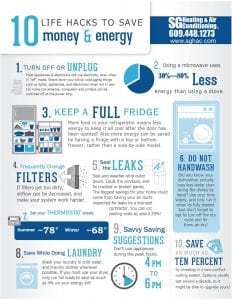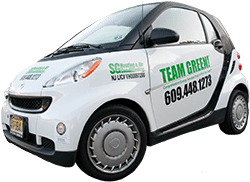March 12th, 2022

The best part is that, contrary to the famous song by Kermit the Frog (just for fun, we’ve included a clip of this classic tune below), sometimes it is easy “Bein’ Green.”
So if you’re keen on going green, you’ll see what we mean if you take a look at this list of easy ways to cut back on waste and make your home more eco-friendly.
Contents
hide
Small Changes, Big Differences

Lower Your Electricity Consumption.
Electric bills are always going to be a necessary expense, but there are lots of easy ways to lower your electricity consumption:One simple way is by unplugging electric devices when they’re not in use – just turning them “off” won’t always turn off their electricity consumption!
• Energy-efficient bulbs are designed to operate more efficiently, using a higher portion of their energy consumption to make light. This means that compact fluorescent and halogen lights can even help cut your energy bill! How much you’ll save depends upon the type of bulb you replace, your new bulb, and your energy costs. Since replacing light bulbs is relatively inexpensive, this switch can, in some cases, have one of the highest returns-on-investment of any home improvement project! It’s an easy way to cut back on your energy consumption and live in a brighter home.
• Another way to reduce energy consumption is by making wise choices concerning which appliances you use, and when. If you have to cook or reheat a small amount of food, don’t use the oven unless you have to. Microwaves use anywhere from 30-80% less energy than ovens. Also, did you know that the price of electricity changes depending on the time of day? At times of day when demand is higher, (especially between the hours of 4 p.m. and 6 p.m.), electricity costs more, so you’ll save money by reshuffling your schedule to minimize electricity usage during these hours.
• Fill up your fridge! A full refrigerator uses less energy than an empty one, and a top or bottom freezer uses less energy than a side-by-side model.
Switch to Eco-Friendly Household Products.
Most traditional household products are composed of chemicals that are slowly damaging our eco-system. When these chemicals are washed down the drain, many of those contaminants end up in our lakes, rivers, and oceans. An easy way to prevent this from happening is switching to organic and eco-friendly household products. These products do not contain these harmful chemicals and limit the damage to our ecosystem.Insulate for Heating & Cooling Benefits.
In a well-insulated home, less warm air escapes from the house during the winter, and less cool air escapes during the summer, reducing the amount of energy needed for heating and cooling. This characteristic makes insulation is a huge eco-friendly benefit no matter what season it is.If at all possible, you should insulate walls, floors and attic spaces. The average house can save approximately $600 every year with attic insulation. These savings continues to go up when you insulate your walls and floors and take other steps to reduce drafts!
Take Water Conservation Seriously.
We might not see the impact daily, but most Americans actually use much more water than they need. Water shortages restrict the amount of water available for crops, which affects our ability to feed ourselves and even clothe ourselves. You don’t have to make any crazy changes in your lifestyle to save water. Here are some simple habits to get into:• Turn the faucet off while you brush your teeth
• Run your dishwasher at night. Like electricity, the price of water is at times of day when demand is higher, so running the dishwasher at night saves money. Also, keep in mind that you’ll use less water by using a dishwasher than by washing your dishes by hand.
• Repair any leaky pipes or faucets (including the hoses outside.)
• When doing laundry, use cold water if possible and dry the laundry on a clothesline if you have one when the weather allows it. When you use your dryer, dry more clothes at once by putting in a full load of laundry.
• Use sprinklers sparingly, if at all. There’s nothing wrong with keeping your lawn hydrated during a dry spell, but only use them if you think it’s absolutely necessary. Be sure to position your sprinkler so that as much water as possible goes onto the grass, not onto the curb, driveway, or street. When you use your sprinklers, leave them on long enough to fully saturate the lawn’s roots. If all you do is sprinkle the blades of grass, the water will evaporate and not benefit the lawn at all.
Recycle & Cut Waste Where You Can.
When items aren’t recycled properly they are added to a landfill. Landfills contain massive piles of garbage that will take longer than the average human lifespan to fully decompose. Some easy ways to reduce waste in landfills include:• Keeping a reusable straw on you
• Using kitchenware instead of disposable cups, plates, and utensils
• Recycling all items that can be recycled
• Avoiding plastic water bottles if possible
• Donating clothes you don’t need anymore, instead of throwing them out
• Reduce food waste. Instead of throwing out an unfinished meal, save the leftovers for the next day’s lunch or dinner. Food packaging is also a major source of waste. Buying fewer processed foods means less plastic to throw out.
Change Your Air Filters.
Of all the money-saving, energy-saving tips we’ve shared, this is the one we share most often. Maybe we’re showing a little favoritism toward it because we’re an HVAC contractor, but we think this is one of the easiest and most important ways to make your home more energy efficient – and it saves money and improve your Princeton, NJ home’s Indoor Air Quality to boot!Set Your Thermostat Wisely.
If you have unrealistic expectations for your heating or cooling system, you can put unnecessary strain on it. The bigger the difference between the outside temperature and the temperature at which you set your thermostat, the harder your HVAC system will have to work. For every degree cooler you set your thermostat during the winter, the energy used by your heating system decreases by 3% over a 24-hour period. The same rule applies during the summer: for every degree you set your thermostat above 72°F, your AC uses 3% less energy. By aiming for around 68°F during the winter and 78°F during the summer, you can save energy and money while making hardly any sacrifice in comfort. (Read more about how to set your thermostat).Upgrade Your Heating & Cooling System.
One of the best ways to decrease your heating and cooling costs is by upping the energy efficiency of your HVAC system. You shouldn’t replace a brand new system, but if your HVAC system is near the end of its expected lifespan and needs an expensive repair, don’t pass up the opportunity for long-term savings. Buying an HVAC system that’s properly sized and completely compatible with your home can bring about huge savings on energy costs. Savings of 30% or even higher are possible with an energy-efficient system. To learn more about high-quality, high-efficiency HVAC installations in West Windsor, NJ and surrounding areas, call us at 609-448-1273 or fill out our contact form!All Content © 2022 SG Heating & Air Conditioning LLC – All Rights Reserved


